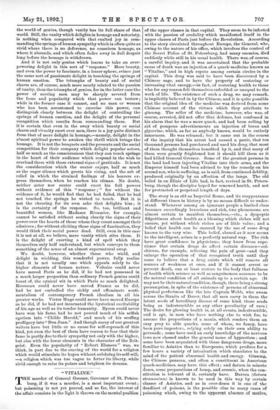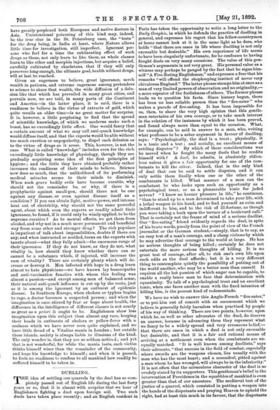" VITAL1NE."
THE murder of General Greaser, Governor of St. Peters- burg, if it was a murder, is a most important event ; but poisoning is not yet proved, and so far, the interest of the affair consists in the light it throws on the mental position of the upper classes in that capital. They seem to be infected with the passion of credulity which manifested itself in the upper classes of Paris just before the Revolution. According to the story circulated throughout Europe, the General, who, owing to the nature of his office, which involves the control of the Secret Police of St. Petersburg, had many enemies, died suddenly while still in his usual health. There was, of course, a careful inquiry, and it was ascertained that the probable cause of death was an injection of a quack-medicine known as " Vitaline," and in high repute among certain circles in the capital. This drug was said to have been discovered by a Chinese sage, and to have the property of restoring or increasing vital energy,—in fact, of restoring health to those who for any reason felt themselves enfeebled or unequal to the work of life. The existence of such a drug, we may remark, is implicitly believed in by the Chinese, and it is quite possible that the original idea of the medicine was derived from some Chinese account of the virtues which they attribute to ginseng. The seller of the medicine, however, who was, of course, arrested, did not offer that defence, but confessed in his alarm that he was a mere quack, and had been selling by aid of pompous advertisements an injection of borax and glycerine, which, as far as anybody knows, would be entirely innocuous. He was released ; but it came out in the course of the inquiry that his arrest had caused a panic, that ten thousand persons had purchased and used his drug, that most of them thought themselves benefited by it, and that many of them were greatly frightened lest it should kill them as it had killed General Gresaer. Some of the greatest persons in the land had been injecting -Vitaline into their arms, and the Emperor himself had been advised to try the remedy on his second son, who is suffering, as is said, from continued debility, produced originally by an affection of the lungs. The old belief in an Elixir of Life had, in fact, revived in St. Peters- burg, though the disciples hoped for renewed health, and not for protracted or perpetual length of days.
The story is as old as Imperial Rome, and its reappearance at different times in history is by no means difficult to under- stand. Whenever among an ignorant people a limited class becomes exceedingly luxurious and rich, two phenomena are almost certain to manifest themselves,—viz., a dyspeptic fidgettiness about health as a blessing which riches will not ensure, yet without which riches are of little value ; and a belief that health can be ensured by the use of some drug known to the very wise. This belief, absurd as it now seems to the intelligent, arises in a perfectly natural way. The rich have great confidence in physicians ; they know from expe- rience that certain drugs do affect certain diseases—col- chicum, for example, relieving the pain of gout—and they enlarge the operation of that recognised truth until they come to believe that a drug exists which will remove all sources of weakness at once, and if it cannot arrest or prevent death, can at least restore to the body that fullness of health which science as well as sanguineness assumes to be the natural condition of all animals up to a certain age. (It may not be their natural condition, though, there being a strong presumption, in spite of the existence of persons of abnormal physical perfectness like the late Captain Webb, who swam across the Straits of Dover, that all men carry in them the latent seeds of hereditary disease of some kind, those seeds being as indestructible as any other peculiarity of race.) The desire for glowing health is, at all events, indestructible, and is apt, in men who have nothing else to wish for, to assume the proportions of a mania, which renders them an easy prey to able quacks, some of whom, we fancy, have been pure impostors, relying solely on their own ability to persuade ; some have used an early knowledge of the nervous laws now classed under the general name of hypnotism ; and some have been acquainted with those dangerous drugs, more familiar to Asiatics than to Europeans, which produce for a few hours a variety of intoxication which simulates to the mind of the patient abnormal health and energy. Ginseng, the Chinese panacea, and often a constituent in American quack-medicines, may have this effect ; and datura in minute doses, some preparations of hemp, and arsenic, when the con- stitution is tolerant of it, certainly have. Datura (clatura stramonium) is known to be used in this way by certain classes of Asiatics, and as in over-doses it is one of the deadliest of poisons, is the possible clue to many cases of poisoning which, owing to the apparent absence of motive,
have greatly perplexed both European and native doctors in Asia. Unintentional poisoning of this kind may, indeed, be the true clue in the St. Petersburg case, the " testa " for the drug being, in India at least, where Nature allows little time for investigation, still imperfect. Ignorant per- sons who feel for a time the exhilarating effect of such drugs as these, not only learn to like them, as whole classes learn to like ether and morphia injections, but acquire a belief, carefully cultivated by charlatans, that if they will only persevere long enough, the ultimate goal, health without drugs, will at last be reached.
Given an eagerness to believe, great ignorance, much wealth in patients, and extreme eagerness among pretenders to science to share that wealth, the wide diffusion of a delu- sion like that which has prevailed in many great cities, and prevails now, we are told, in many parts of the Continent and America—in the latter place, it is said, there is a readiness to believe in the virtue of extracts of gold, which quite recalls an older time—is no great matter for surprise. It is, however, a little perplexing to find that the spread of scientific knowledge, of which we moderns make such a boast, has so exceedingly little effect. One would fancy that a certain amount of what we may call anti-quack knowledge would diffuse itself, and that the experts would be able without too much exertion or unpopularity, to dispel each delusion as to the virtue of drugs as it arose. This, however, is not the ease. What is called "knowledge" includes even for the rich exceedingly little knowledge of physiology, though they are gradually acquiring some idea of the -first principles of hygiene ; and the little they have obtained probably rather increases the readiness of their minds to believe. Science now does so much, that the unlikelihood of its performing medical miracles seems to their minds to diminish When such grave bodily evils have become curable, why should not the remainder be, or why, if there is a prophylactic against small-pox, should there not be one against any disease, or even against disease itself as a condition ? If you can obtain light, motive-power, and intense heat out of electricity, why should not the same powerful agent, about which even the experts so readily admit their ignorance, be found, if it could only be wisely applied, to be the supreme curative P As to mental effects, we get them from alcohol, and why not in a much more permanent and beneficial way from some other and stronger drug? The rich populace is impatient of talk about impossibilities, doubts if there are any, and when instructed or scolded, turns on the experts with taunts about—what they fully admit—the enormous range of their ignorance. If they do not know, as they do not, what vitality is, how should they know whether there can or cannot be a substance which, if injected, will increase the sum of vitality? There are certainly plenty which will de- crease or destroy it. Men infected with hope in a drug learn almost to hate physicians—we have known lay homceopaths and anti-vaccination fanatics with whom this feeling was almost a passion—and except among men of balanced sense, their natural anti-quack influence is cut up by the roots, just as it is among the ignorant by an outburst of epidemic disease. In Southern Europe, when cholera or typhus begins to rage, a doctor becomes a suspected person ; and when the imagination is once stirred by fear or hope about health, the difference in the intelligence of different classes is not nearly so great as a priori it ought to be. Englishmen show less imagination upon this subject than almost any race, keeping their heads in outbursts of cholera or yellow-fever with a coolness which we have never seen quite explained, and we have little dread of a Vitaline mania in London ; but outside these islands, society is always liable to illusions of the kind. The only wonder is, that they are so seldom noticed; and yet that is not wonderful, for while the mania lasts, each victim thinks himself wiser than the remainder of the community, and hugs his knowledge to himself; and when it is passed, he feels no readiness to confess to all mankind how readily he suffered himself to be taken in.



































 Previous page
Previous page